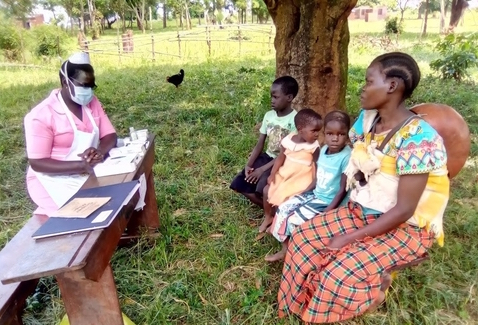GULU DISTRICT, Uganda—It was while looking after patients at the health centre where she works that Joyce Achan realised her dress was stained with menstrual blood – and there was nothing she could do about it. Known as period poverty, many female health-care workers at the frontline of the COVID-19 response are experiencing this kind of discomfort.
I told my female colleague that my dress is spoiled and I cannot even get up and walk to some place where I can go easily and change.
“I told my female colleague that my dress is spoiled and I cannot even get up and walk to some place where I can go easily and change, because we do not have any place around our working area where you can go and change your pad or try to freshen up,” she said. Ms. Achan is the Nurse-in-Charge at Otino Health Centre in Gulu District.
Period poverty affects women and girls the world over and it prevents them from managing their menstruation without suffering shame or stigma.

regulations, hard-to-reach areas have become even harder to reach.
© UNFPA Uganda.
Even prior to the current COVID-19 pandemic, many young women and adolescent girls had limited or no access to sanitary products nor the safe, hygienic spaces they need to be able to manage their use.
As countries far and wide have instituted lockdowns to prevent the spread of the coronavirus, for many women and girls of reproductive age this has exacerbated the challenges associated with implementing good menstrual health management.
“With lockdowns and strict mobility regulations, hard-to-reach areas have become even harder to reach. WoMena has moved into virtual research to better understand how we can serve such communities,” said Meggie Duma, Project Manager for WoMena Uganda.
“WoMena has been active in trying to ensure that women and girls have access to information on how menstrual cycles are being impacted by COVID-19-related stress,” said Ms. Duma.
As a woman’s menstrual cycle does not pause for pandemics, the time has come to end period poverty for all women and girls. In partnership with UNFPA, the United Nations sexual and reproductive health agency, WoMena advocates for and promotes dignified menstrual health management, as well as the promotion of sexual and reproductive health and rights.
We will continue to boldly and urgently take action so that every woman and girl can enjoy their sexual and reproductive health and rights, and not be limited or held back by their periods.
“We will continue to boldly and urgently take action so that every woman and girl can enjoy their sexual and reproductive health and rights, and not be limited or held back by their periods,” said Dr. Julitta Onabanjo, UNFPA Acting Deputy Executive Director (Programme) during a webinar that was organized on Menstrual Hygiene Day on 28 May.
“The theme of this year’s Menstrual Hygiene Day, ‘It’s time for action’, is an urgent call to all of us to voice collectively that menstrual health and hygiene, and sexual and reproductive health and rights, should not be an addendum or afterthought to the COVID-19 response,” she said.
Increase access to menstrual hygiene products for frontline workers
For many female health-care workers, especially those living and providing health care in rural settings, managing their menstru
At the very least, female health-care providers at the frontline of the pandemic deserve to be able to carry out their critical service of providing care while receiving due respect, in dignity, and with their human rights protected in full.
“The COVID-19 period has been a challenge ... as one needs to have reliable transport to get to town as one cannot [go on] foot for 15 kilometres just to get to town to access menstrual
As the number of infected people in need of health care rises, female health-care providers have increasingly limited time to look after themselves, including to purchase the menstrual products they need. Making matters worse, panic buying of supplies including menstrual products, and the disruption of supply chain activities, have contributed to limited access to and availability of menstrual products.
Periods do not stop for pandemics and neither must we. We [should] seize this unprecedented time to plan better.
“Menstrual health information, education, products and services are being set aside or ignored in many national COVID-19-related responses and recovery efforts,” said Dr. Onabanjo. “Periods do not stop for pandemics and neither must we. We [should] seize this unprecedented time to plan better.”
Creating a safe, conducive and supportive environment for frontline health-care providers should be our goal, she stressed. This should include the provision of menstrual hygiene products along with personal protective equipment (PPE).
It will be good to have menstrual products put together with COVID-19 PPE packages to help female health-care workers manage their periods with dignity.
Irene Alel, a nurse at Kalali Health Centre 2 in Uganda, agrees: “It will be good to have menstrual products put together with COVID-19 PPE packages to help female health-care workers manage their periods with dignity.”
Periods should not be an afterthought – or worse, cause for punishment or deprivation of bodily integrity. It is important to provide access to clean water and sanitation, and the facilities needed to ensure the health and hygiene of those who menstruate, while protecting their rights and dignity.
At a minimum, governments and non-state actors, including civil society organizations and the private sector, must ensure that those engaged in crucial work on the frontlines, including female health-care providers, are able to fulfil their basic needs – including menstrual health management.
- Derick Nyasulu



